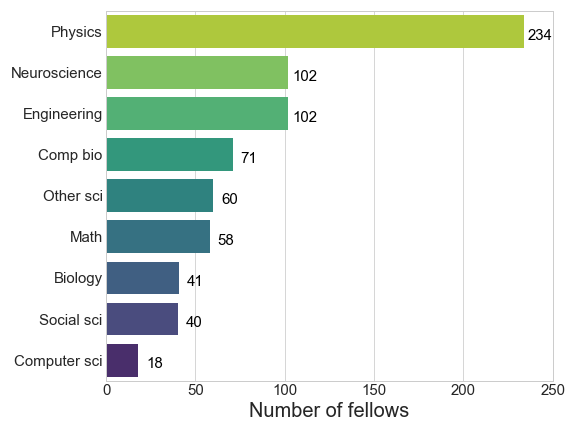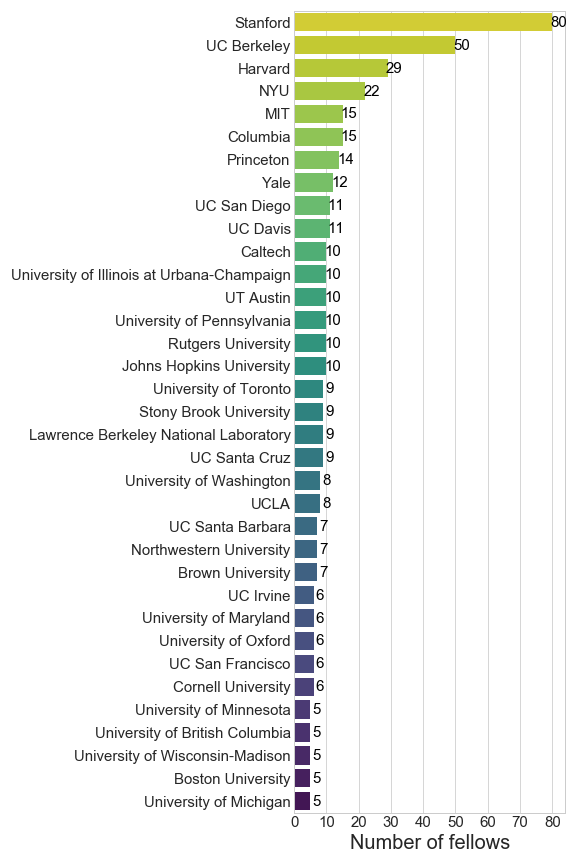Analysis of Insight Data Science Fellows
May 10, 2018
The Insight Data Science Fellows program is a highly sought-after post-doctoral training fellowship to help PhD graduates find a good job in data science. I was curious about the background of the fellows (e.g. how many are from UC San Diego? Neuroscience?) and where they ended up. I couldn’t find any aggregated information about them, so I scraped their list of fellows and summarized them in the following figures (see Jupyter Notebook).
UPDATE: After completing the program, I wrote this post on its pros an cons.
Insight fellows dataset overview
For each fellow, I scraped 6 features:
- Academic field (e.g. Physics)
- Last academic position (PhD or Postdoc)
- Academic institution (e.g. UC San Diego)
- Title (e.g. Senior data scientist)
- Company (e.g. Twitter)
- Insight project title (e.g. “Parental Guidance: Finding Yelp reviews written by parents”)
In total, 794 fellows were scraped (considerably less than Insight’s advertised >1400 fellows). I was unable to get academic backgrounds of 68 of these fellows because of difficult in parsing their descriptions, leaving 726 fellows to analyze. Of these fellows, 65% recently finished a PhD and 29% are recovering from a postdoc. 18% of the fellows went on into senior data science positions.




Relation between fellow background and data science position
I was curious if there were any correlations between where a fellow came from and where they ended up (e.g. does a certain company tend to recruit from a certain field?). To analyze this, I created crosstabs between each pair of fellow features and analyzed whether there were any potentially significant biases. For the most part, there were very few significant correlations, but I came up with the following preliminary hypotheses. Because I tested hundreds of potential hypotheses, and these effects are generally small, claims of statistical significance are not appropriate here.
- Fellows going to Facebook and Gartner rarely have senior positions, while those at Insight Data Science always have senior positions, and ~50% fellows at Netflix and ~35% of fellows at LinkedIn have senior positions.
- Neuroscientists disproportionately work at Insight Data Science. Square disproportionately takes physicists, and Facebook samples roughyl equally from all fields.
- Fellows from biology are disproportionately likely to have senior data science positions (22%), while those from Math are less likely (10%)
- Fellows whose project names contain the word “find” are disproportionately likely to come from Harvard or Columbia and go to StitchFix or Yelp
- Fellows from Caltech disproportionately have senior positions (7/10 vs. 18% baseline)
- NYU, UC Davis, and U Penn fellows are disproportionately from neuroscience.
I noticed multiple differences between the PhD and postdoc fellow populations:
- Senior positions are more likely to be obtained by fellows with post docs (22%, 47/211) than fellows just with PhDs (17%, 78/472).
- Postdocs disproportionately analyzed Twitter in their Insight project (14/211, 7%) compared to PhD fellows (11/472, 2%)
- Fellows from NYU disproportionately tend to be postdocs (11/22, 50% compared to 27% baseline)
- Neuroscience fellows are more likely to be postdocs (43/102, 42%), while social science and engineer fellows are less likely to be postdocs (16% and 15%, respectively)